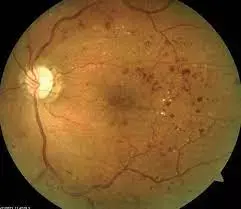- Home
- Medical news & Guidelines
- Anesthesiology
- Cardiology and CTVS
- Critical Care
- Dentistry
- Dermatology
- Diabetes and Endocrinology
- ENT
- Gastroenterology
- Medicine
- Nephrology
- Neurology
- Obstretics-Gynaecology
- Oncology
- Ophthalmology
- Orthopaedics
- Pediatrics-Neonatology
- Psychiatry
- Pulmonology
- Radiology
- Surgery
- Urology
- Laboratory Medicine
- Diet
- Nursing
- Paramedical
- Physiotherapy
- Health news
- Fact Check
- Bone Health Fact Check
- Brain Health Fact Check
- Cancer Related Fact Check
- Child Care Fact Check
- Dental and oral health fact check
- Diabetes and metabolic health fact check
- Diet and Nutrition Fact Check
- Eye and ENT Care Fact Check
- Fitness fact check
- Gut health fact check
- Heart health fact check
- Kidney health fact check
- Medical education fact check
- Men's health fact check
- Respiratory fact check
- Skin and hair care fact check
- Vaccine and Immunization fact check
- Women's health fact check
- AYUSH
- State News
- Andaman and Nicobar Islands
- Andhra Pradesh
- Arunachal Pradesh
- Assam
- Bihar
- Chandigarh
- Chattisgarh
- Dadra and Nagar Haveli
- Daman and Diu
- Delhi
- Goa
- Gujarat
- Haryana
- Himachal Pradesh
- Jammu & Kashmir
- Jharkhand
- Karnataka
- Kerala
- Ladakh
- Lakshadweep
- Madhya Pradesh
- Maharashtra
- Manipur
- Meghalaya
- Mizoram
- Nagaland
- Odisha
- Puducherry
- Punjab
- Rajasthan
- Sikkim
- Tamil Nadu
- Telangana
- Tripura
- Uttar Pradesh
- Uttrakhand
- West Bengal
- Medical Education
- Industry
Omega-3 Fatty Acids fail to provide protection against retinopathy among diabetes patients

Omega-3 Fatty Acids fail to provide protection against retinopathy among diabetes patients suggests a new study published in the Ophthalmology.
Results from a substudy of the ASCEND trial suggest that the use of omega-3 fatty acids had no clinically meaningful benefit compared to placebo for the development of diabetic retinopathy.
“Preclinical studies demonstrate a protective role for omega-3 fatty acids in diabetic retinopathy, but these observations have not been confirmed in randomized trials,” the researchers write.
The safety and effectiveness of omega-3 fatty acids on health has been under the microscope of cardiometabolic health study participants for a decade. Although much of the attention has been devoted to the REDUCE-IT and STRENGTH studies, which examined icosapent ethyl (Vascepa) and an EPA/DHA agent, respectively, several other studies have been initiated to further explore the associations between different forms of omega to study -3 fatty acids, like the ASCEND study.
In a double-blind, randomized, placebo-controlled trial of adult patients aged 40 years and older with diabetes but no apparent cardiovascular disease, the A Study of Cardiovascular Events in Diabetes (ASCEND), 15,480 patients were randomized to a 1st course -gram capsule containing 460 mg eicosapentaenoic acid and 380 mg docosahexaenoic acid or equivalent placebo with olive oil daily. The study’s primary outcome of interest was first major vascular event and median follow-up duration of 7.4 years.
The results of the study indicate that a major vascular event occurred in 8.9% of the omega-3 fatty acid group and 9.2% of the placebo group (rate ratio). [RR], 0.97; 95% confidence interval [CI]0.87 to 1.08; P=.55). Further analysis showed that all-cause deaths occurred in 9.7% of the omega-3 fatty acid group and 10.2% of the placebo group (RR: 0.95; 95% CI: 0.86 to 1, 05).
In a substudy of the ASCEND trial called ASCEND-EYE, a team of researchers led by Jane Armitage, FRCP, FFPH, from the Nuffield Department of Public Health, used linked data from the records of the NHS Diabetic Eye Screening Program in England and Wales to To identify participants from the study who developed diabetic retinopathy. The investigators noted that ocular events reported were assessed through medical record review.
The primary efficacy outcome of interest for the subsidy was time to first record of a communicable disease after randomization, which researchers defined as a combination of communicable retinopathy or communicable maculopathy based on evaluation criteria established by the UK National Screening Committee . The sub-study also included several secondary and tertiary outcomes, such as: B. Transferable disease outcomes stratified by baseline DR severity, any progression of retinopathy grade, and incident diabetic maculopathy.
A total of 7360 participants with linkage data were included in the current study, representing 48% of those randomized in ASCEND. At baseline, this cohort had a mean age of 63.5 (standard deviation: 8.9) years, 62% of the group were male, 96% were white, and 95% had type 2 diabetes. The median follow-up duration in this cohort was 6.5 years.1.4
In the analysis, 14.8% of the omega-3 fatty acid group and 13.9% of the placebo group experienced a transmissible disease event (RR: 1.07; 95% CI: 0.95-1.20 ; P=.29). Further analysis revealed that there were no statistically significant differences between groups in
the proportion of events for the secondary or tertiary endpoints.
Reference:
Sammons EL, Buck G, Bowman LJ, et al. ASCEND-Eye: Effects of Omega-3 Fatty Acids on Diabetic Retinopathy. Ophthalmology. Published online December 3, 2023. doi:10.1016/j.ophtha.2023.11.030
Keywords:
Omega-3, Fatty, Acids, fail, provide, protection, against, retinopathy, among, diabetes, patients, Sammons EL, Buck G, Bowman LJ, Ophthalmology
Dr. Shravani Dali has completed her BDS from Pravara institute of medical sciences, loni. Following which she extensively worked in the healthcare sector for 2+ years. She has been actively involved in writing blogs in field of health and wellness. Currently she is pursuing her Masters of public health-health administration from Tata institute of social sciences. She can be contacted at editorial@medicaldialogues.in.
Dr Kamal Kant Kohli-MBBS, DTCD- a chest specialist with more than 30 years of practice and a flair for writing clinical articles, Dr Kamal Kant Kohli joined Medical Dialogues as a Chief Editor of Medical News. Besides writing articles, as an editor, he proofreads and verifies all the medical content published on Medical Dialogues including those coming from journals, studies,medical conferences,guidelines etc. Email: drkohli@medicaldialogues.in. Contact no. 011-43720751


